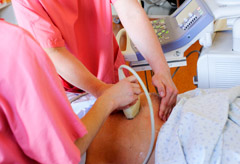UK stillbirth rate among highest in Europe
Shocking reports suggests 4,000 stillborn babies in the UK could be saved each year with increased awareness among health professionals

Shocking reports suggests 4,000 stillborn babies in the UK could be saved each year with increased awareness among health professionals
Every year, about 4,000 UK babies die unnecessarily in the last few months of pregnancy or during labour, according to a major new series of reports by the Lancet, giving Britain one of the highest rates of stillbirth in Europe.
Only 5 per cent of the 2.6million babies stillborn worldwide in 2009 had congenital abnormalities, and a third of stillbirths remain unexplained in the UK, although poor NHS maternity care is thought to play a part in more than 600 deaths a year.
‘The grief of a stillborn is unlike any other form of grief,’ says Dr Richard Horton, editor in chief of Lancet. ‘Almost three million stillbirths happen worldwide every year, which, even for a country with a developed health system such as the UK, means 11 sets of parents every day will take home their newborn baby in a coffin.’
Neal Long, chief executive of stillbirth and neonatal death charity, Sands, says: ‘The deaths of 11 babies every day is a national scandal which has persisted for far too long in this country.’
The charity puts the poor UK performance down to a lack of awareness, not just among pregnant women but also health professionals. Most stillbirths are potentially preventable, but insufficient work has been done to establish whose babies are at higher risk.
It is known that obesity, smoking and older age increase the risk factors in pregnancy, but Sand’s say the possibility of stillbirth is often not raised so parents are unaware of the problem.
Celebrity news, beauty, fashion advice, and fascinating features, delivered straight to your inbox!
Each year, 500 babies die during labour in the UK. An investigation in the West Midlands into 25 deaths of babies during labour found there was sub-standard care in all of them, and that 21 of those babies could have survived.
President of the Royal College of Obstetricians and Gynaecologists, Tony Falconer, welcomed the reports, adding: ‘Although we have good information about social demographics of stillbirth, we need to know more about the pathology of stillbirth and more research in this area is needed.’
For more information, or for help and advice on stillbirth, visit the NHS Choices website.